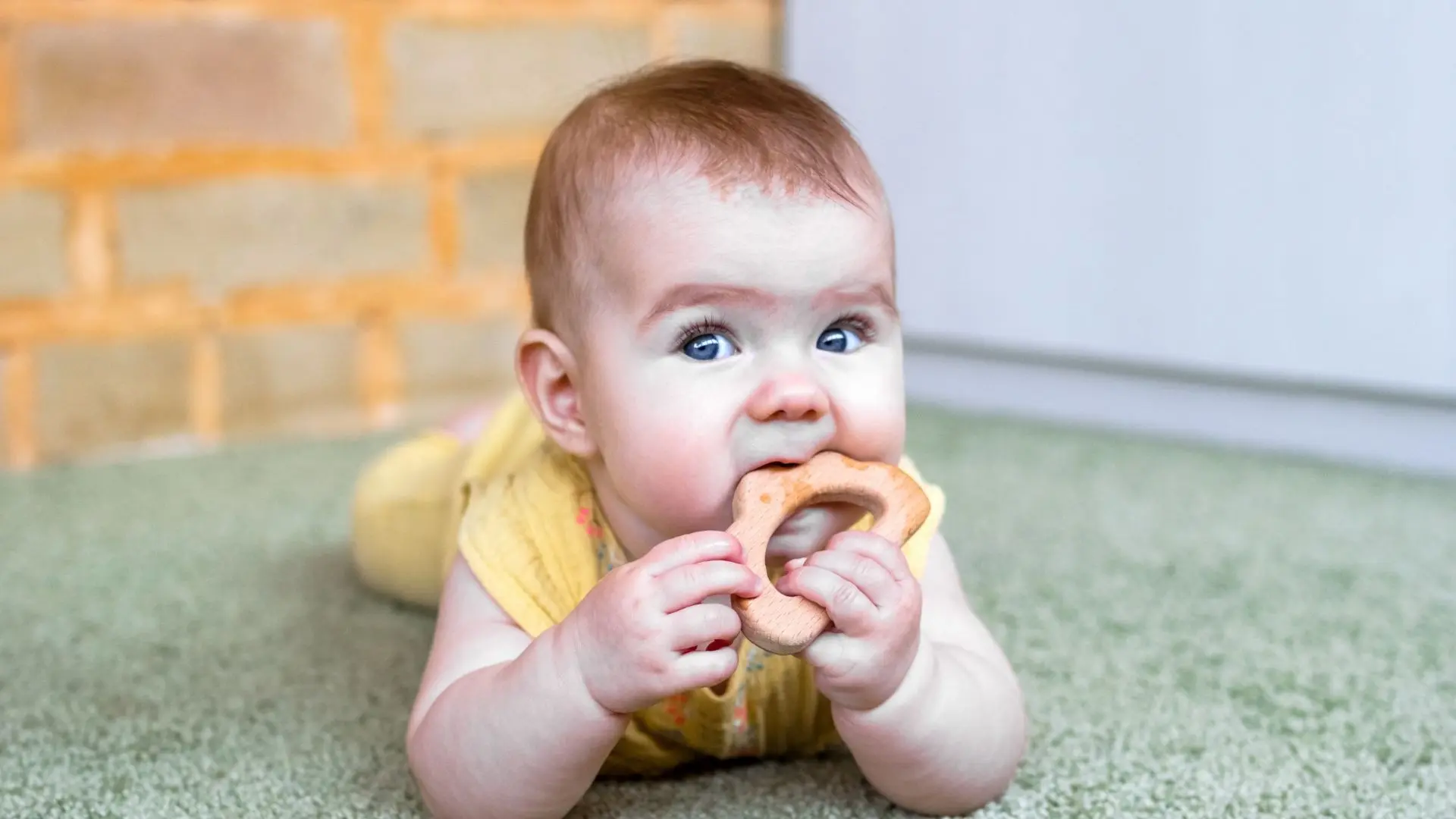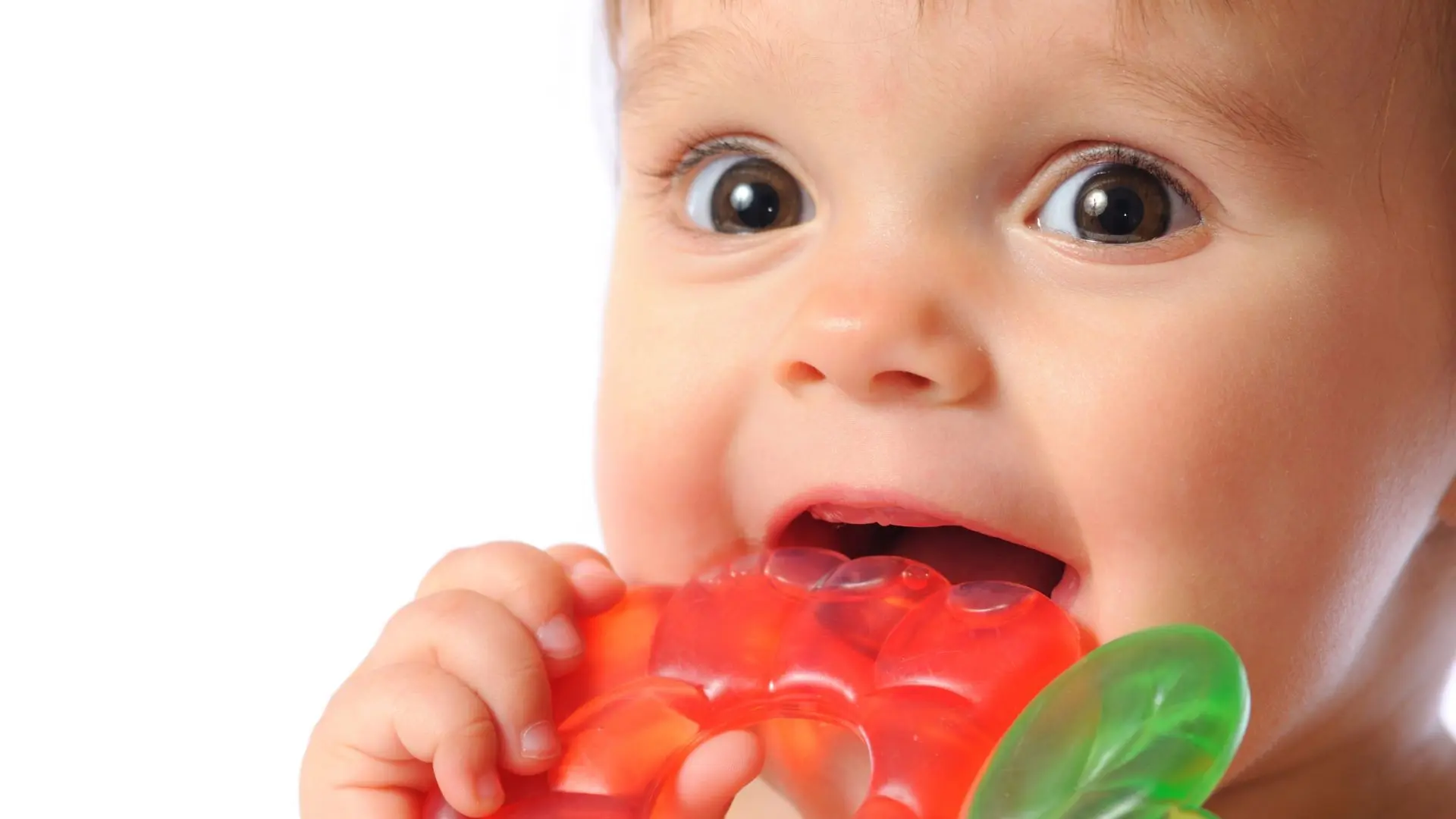A comprehensive overview of teething symptoms, coping strategies, and debunks common myths surrounding teething. It aims to equip parents with the knowledge and tools necessary to navigate this developmental milestone with confidence and ease.

Teething is a natural and inevitable process in a baby’s development, but it can be a challenging time for both infants and their parents. As teeth begin to emerge through the gums, babies may experience a range of symptoms that can vary in intensity and duration. Understanding these teething symptoms is crucial for parents to provide appropriate care and support for their little ones. In this comprehensive guide, we’ll delve into the various teething symptoms, explore effective coping strategies, and debunk common myths surrounding this developmental milestone.
What is Teething?
Teething is the process by which an infant’s first set of teeth, also known as primary or baby teeth, begin to emerge through the gums. This typically occurs between the ages of 4 to 7 months, although the timing can vary widely from one child to another. The process continues until around the age of 3, when most children have their full set of 20 primary teeth.

Teething Symptoms
1. Irritability and Increased Crying: One of the most common signs of teething is irritability and fussiness in babies. They may become more cranky than usual and cry more frequently, especially during feeding and sleeping times. This is often due to the discomfort and pain caused by the pressure of the emerging teeth against the gums.
2. Gnawing and Chewing: Babies instinctively seek relief from teething discomfort by gnawing and chewing on objects. You may observe your baby chewing on their fingers, toys, or even household items like furniture. Providing safe teething toys or chilled (not frozen) teething rings can offer relief and help soothe sore gums.
3. Excessive Drooling: Teething stimulates the production of saliva in babies, leading to excessive drooling. You may notice that your baby’s clothes are constantly damp or that they develop a rash around their mouth and chin due to the constant moisture. Keeping a soft cloth handy to gently wipe your baby’s chin can help prevent irritation.
4. Swollen or Sensitive Gums: As teeth begin to push through the gums, the surrounding tissue may become swollen, red, and sensitive to touch. You might notice a small, raised bump where the tooth is about to erupt. Gently massaging your baby’s gums with a clean finger or using a cold teething ring can help alleviate some of the discomfort.
5. Changes in Eating and Sleeping Patterns: Discomfort from teething can disrupt your baby’s usual eating and sleeping patterns. They may refuse to feed or eat less than usual due to sore gums, or they may wake up more frequently during the night. Offering smaller, more frequent feedings and establishing a soothing bedtime routine can help minimize disruptions.
6. Ear Pulling and Cheek Rubbing: Some babies may tug at their ears or rub their cheeks while teething. This behavior is often mistaken for an ear infection, but it’s usually just a result of the discomfort radiating from the gums to the ears and cheeks. However, if you’re concerned about your baby’s symptoms or if they develop a fever, consult your pediatrician.
7. Mild Fever and Diarrhea: While teething itself doesn’t typically cause fever or diarrhea, some babies may experience a slight increase in body temperature or changes in bowel movements during this time. These symptoms are often attributed to the baby’s immune system responding to the stress of teething rather than directly caused by the teething process itself. However, if your baby’s fever exceeds 100.4°F (38°C) or if they have severe diarrhea, seek medical attention.
Coping Strategies for Teething
1. Provide Comfort and distraction: Comforting your baby during teething can help alleviate their discomfort and reduce fussiness. Gentle rocking, cuddling, and singing lullabies can provide comfort and distraction. You can also try using a clean finger to massage your baby’s gums or offer a chilled teething ring for them to chew on.
2. Use Teething Toys and Devices: Teething toys and devices designed specifically for infants can provide relief by allowing them to chew and gnaw on safe surfaces. Look for toys made from soft, BPA-free materials that are easy for your baby to grasp and manipulate. Chilled teething rings or silicone teethers can help numb sore gums and provide temporary relief.

3. Maintain Good Oral Hygiene: Even before your baby’s first tooth emerges, it’s essential to start practicing good oral hygiene habits. Use a soft, damp cloth to wipe your baby’s gums after feedings to remove milk residue and bacteria. Once teeth begin to erupt, gently brush them with a soft-bristled toothbrush and a smear of fluoride toothpaste twice a day.
4. Offer Cold Foods and Drinks: Cold foods and drinks can help numb sore gums and provide relief for teething babies. Offer chilled purees, yogurt, fruit popsicles, or breast milk in a silicone feeder for your baby to suck on. Avoid giving frozen foods or objects that could pose a choking hazard, and always supervise your baby during feeding.

5. Try Over-the-Counter Remedies Sparingly: Over-the-counter teething gels and medications are available to help alleviate teething discomfort, but they should be used sparingly and according to the manufacturer’s instructions. Consult your pediatrician before using any medications, especially if your baby is under 6 months old or has underlying health conditions.
6. Maintain Regular Pediatric Check-ups: Regular visits to your pediatrician are essential for monitoring your baby’s overall health and development, including their teething progress. Your pediatrician can offer guidance on managing teething symptoms, recommend appropriate remedies, and address any concerns you may have about your baby’s well-being.
7. Offer Distraction and Entertainment: Keeping your baby entertained and distracted can help take their mind off teething discomfort. Engage them in interactive play, read books together, or go for a stroller walk to provide a welcome distraction from sore gums. Distraction can also help reduce fussiness and irritability associated with teething.

8. Practice Patience and Understanding: Teething can be a challenging time for both babies and parents, so it’s essential to practice patience and understanding. Remember that your baby is experiencing discomfort and may be more irritable than usual. Respond with love, empathy, and reassurance, and know that this phase will eventually pass.
Monitor for Signs of Teething Complications: While teething is generally a harmless process, it’s essential to monitor for signs of complications that may require medical attention. These include persistent high fever, severe diarrhea, excessive swelling or redness of the gums, and refusal to eat or drink for an extended period. If you notice any concerning symptoms, contact your pediatrician promptly.
Seek Support from Other Parents: Connecting with other parents who are going through similar experiences can provide valuable support and reassurance during the teething phase. Join online parenting forums or local support groups to share tips, experiences, and coping strategies with other caregivers. Knowing that you’re not alone in this journey can make a significant difference in managing teething-related challenges.
Debunking Common Teething Myths
1. Teething Causes High Fever: While mild fever is sometimes associated with teething, temperatures above 100.4°F (38°C) are not typically caused by teething alone. If your baby has a high fever, it’s essential to consult your pediatrician to rule out other possible causes of illness.
2. Teething Delays Developmental Milestones: Teething may temporarily disrupt your baby’s eating and sleeping patterns, but it does not cause significant delays in developmental milestones such as crawling, walking, or talking. Each child develops at their own pace, and teething is just one small part of their overall growth and development.
3. Teething Causes Diarrhea: While some babies may experience changes in bowel movements during teething, such as loose stools or diarrhea, teething itself does not directly cause gastrointestinal issues. If your baby has severe diarrhea or other concerning symptoms, it’s important to seek medical attention to rule out other possible causes of illness.
Conclusion
Teething is a natural and necessary part of a baby’s development, but it can be a challenging time for both infants and parents. By understanding the common teething symptoms and knowing how to cope effectively, you can help alleviate your baby’s discomfort and provide support during this transitional period. Remember to practice patience, offer plenty of comfort and affection, and consult your pediatrician if you have any concerns about your baby’s teething symptoms or overall health. With the right care and attention, you and your baby can navigate the teething process with ease and grace.
You may also be interested in : Newborn Uncircumcised Care: Everything Parents Need to Know